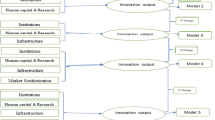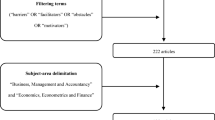Abstract
This paper explores issues related to the impact of Science-Industry relationships on the knowledge production of academic research groups, in particular on the alleged shift to the more applied research end under the influence of business partners' needs. Our findings from a case study of the Belgian Katholieke Universiteit Leuven ((K.U. Leuven) show a significant steady growth over time of publications produced by academic research groups involved in University-Industry linkages, closely related to factors both internal and external to the university that have stimulated academic entrepreneurial behaviour. On an aggregated level for 1985-2000, basic research publications appear to be more present than applied ones, both in total numbers and in growth rates. Our findings show that applied and basic research publications generally rose together in the same year. No clear and generalised evidence of a shift towards the applied research end determined by the involvement in U-I linkages was found, the weak indications of such a shift within groups coming only for groups that have already high applied versus basic orientation. These results suggest that the academic research groups examined have developed a record of applied publications without affecting their basic research publications and, rather than differentiating between applied and basic research publications, it is the combination of basic and applied publications that consolidate the group's R&D potential. Accordingly, critical assessments of the University side of the emerging 'Triple Helix' need to take into account the dynamic nature of the research dimension.
Similar content being viewed by others
References
BUSH, V. (1945), Science, the Endless Frontier, United States Government Printing Office.
CALVERT, J., B. R. MARTIN, (2001), Changing Conceptions of Basic Research?, Background Document for the Workshop on Policy relevance and Measurement of Basic Research, Oslo 29-30 October 2001.
CLARYSSE, B., A. HEIRMAN, J. J. DeGROOF (2001), An institutional and resource-based explanation of growth patterns of research-based spin-offs in Europe, STI Review, 26, 75-96.
DASGUPTA, P., P. A. DAVID (1987), Information disclosure and the economics of science and technology, In: G. R. FEIWEL (Ed.), Arrow and the Ascent of Modern Economic Theory, N.Y. University Press, pp. 519-542.
DASGUPTA, P., P. A. DAVID (1994), Toward a new economics of science, Research Policy, 23: 487-521.
DAVID, P. A., D. MOWERY, W. E. STEINMUELLeR (1992), Analysing the economic payoffs from basic research, Economics, Innovation and New Technology, 2: 73-90.
DAVID, P. A., B. H. HALL (1999), Heart of Darkness: Public-Private Interactions inside the R&D Black Box, American Economic Association Meeting, New York.
DAVID. P., D. FORAY (1995), Accessing and expanding the science and technology base, STI Review, OECD, Paris, pp. 13.68.
De Administratie Wetenschap en Innovatie, IWT-Vlaanderen, Stichting Technologie Vlaanderen, Vlaamse Interuniversitaire Raad, Vlaamse Raad voor Wetenschapsbeleid, Administratie Planning en Statistiek-Het Vlaams Indicatorenboek Wetenschap, Innovatie,Technologie 1999 (The Flemish Indicators Book Science, Innovation, Technology 1999), IWT-Observatorium (http://www.iwt.be)
DeBACKERE, K. (2000), Managing academic R&D as a business at K.U. Leuven: context, structure and process, R&D Management 30 (4): 323-328.
DeNGIS, P., E. DeWALLeF, V. LORIES (2001), Flanders in the European Fourth Framework Programme for Research (1994-1998), Ministry of Flanders, Science, Innovation and Media Department, Science and Innovation Department.
DIMAGGIO, P., W. POWELL (1983), The iron cage revisited: Institutional isomorphism and collective rationality in organizational fields, American Sociological Review, 48: 147-160.
DRUCKER, P. F. (1993), Post-Capitalist Society, Oxford: Butterworth Heinemann.
ETZKOWITZ, H. (1989), Entrepreneurial science in the academy: A case for the transformations of norms, Social Problems, 36: 14-29.
ETZKOWITZ, H. (1996), Post Cold War science. Losing our bearings: The science policy crisis in Post-Cold War Eastern Europe, former Soviet Union and USA, Science and Public Policy, 23 (1): 13-26.
ETZKOWITZ, H. (1998), Science and industrial policy: Beyond the endless frontier, In: MESKE, W., MOSONI-FRIED, J., ETZKOWITZ, H., NESVETAILOV, G. (Eds), Transforming Science and Technology Systems-the Endless Transition?, IOS Press, pp. 57-66.
ETZKOWITZ, H. (1998a), The norms of entrepreneurial science: cognitive effects of the new university-industry linkages, Research Policy, 27: 823-833.
ETZKOWITZ, H., L. LeYDeSDORFF (1997), Introduction to special issue on science policy dimensions of the Triple Helix of university-industry-government relations, Science and Public Policy, 24 (1): 2-5.
ETZKOWITZ, H., L. LeYDeSDORFF (1998), The Endless Transition: A 'Triple Helix' of University-Industry-Government Relations, Minerva, 36: 203-208.
FLORIDA, R., W. M. COHEN (1999), Engine or infrastructure? The university role in economic development, In: L. M. BRANSCOMB, F. KODAMA, R. FLORIDA (Eds), Industrializing Knowledge. University-Industry Linkages in Japan and the United States, MIT Press.
GEUNA, A. (1998), The internationalisation of European universities: A return to medieval roots, Minerva, 36: 253-270.
GEUNA, A. (1999), The Economics of Knowledge Production. Funding and the Structure of University Research, Edward Elgar.
GEUNA, A. (1999a), The Changing Rationale for University Research Funding: Are there Negative Unintended Consequences, Paper no. 33 of SPRU Electronic Working Papers Series, Sussex University, UK.
GIBBONS, M. (1999), Sciences new social contract with society, Nature, 402: C81-C84.
GODIN, B. (1996), Research and the practice of publication in industries, Research Policy, 25: 587-606.
LeYDeSDORFF, L., H. ETZKOWITZ (1996), Emergence of a Triple Helix of University-Industry-Government Relations, Science and Public Policy, 23 (5): 279-286.
LeYDeSDORFF, L., H. ETZKOWITZ (1998), Triple Helix of innovation: introduction, Science and Public Policy 25 (6): 358-364.
MARTIN, B. (2002), The changing social contract for science and the evolution of knowledge production, Paper prepared for the SPRU Conference Rethinking Science Policy. Analytical Frameworks for Evidence-Based Policy, 21-23 March, SPRU, University of Sussex, UK.
MARTIN, B. R. (2001), The changing social contract for science and the evolution of the university, In: GEUNA, A. SALTER, A., STEINMUELLeR, W. E. (Eds), Science and Innovation: Rethinking the Rationales for Funding and Governance.
NONAKA, I., H. TAKEUCHI (1995), The Knowledge-Creating Company. How Japanese Companies Create the Dynamics of Innovation, New York, Oxford: Oxford University Press.
OECD (2002), Benchmarking Industry-Science Relationships, March 2002.
PAVITT, K. (1984), Sectoral patterns of technical change: Towards a taxonomy and a theory, Research Policy, 13: 343-373.
PAVITT, K. (1991), What makes basic research economically useful?, Research Policy, 20: 109-119.
PAVITT, K. (1997), Academic research, technical change and government policy, In: KRIGE, J., PESTRE, D. (Eds), Science in the Twentieth Century, Amsterdam: Harwood Academic Publishers, pp. 143-158.
PAVITT, K. (1998), The social shaping of the national science base, Research Policy, 27 (8): 793-805.
RANGA, L. M. (2003), The Structure and Determinants of the Innovative Capacity of Academic Research Groups Involved in University-Industry Collaboration, Mimeo, SPRU, Sussex University, Brighton, UK.
ROSENBERG, N. (1990), Why do firms do basic research (with their own money)?, Research Policy, 19: 165-174.
Van LOOY, B., L. M. RANGA, J. CALLAERT, K. DeBACKERE, E. ZIMMERMANN (2003), Combining entrepreneurial and scientific performance in Academia: Towards a compounded and reciprocal Matthew Effect?, Research Policy (forthcoming).
VAVAKOVA, B. (1998), The new social contract between governments, universities and society: Has the old one failed? Minerva, 36: 209-228.
Author information
Authors and Affiliations
Rights and permissions
About this article
Cite this article
Ranga, L.M., Debackere, K. & Tunzelmann, N.v. Entrepreneurial universities and the dynamics of academic knowledge production: A case study of basic vs. applied research in Belgium. Scientometrics 58, 301–320 (2003). https://doi.org/10.1023/A:1026288611013
Issue Date:
DOI: https://doi.org/10.1023/A:1026288611013




